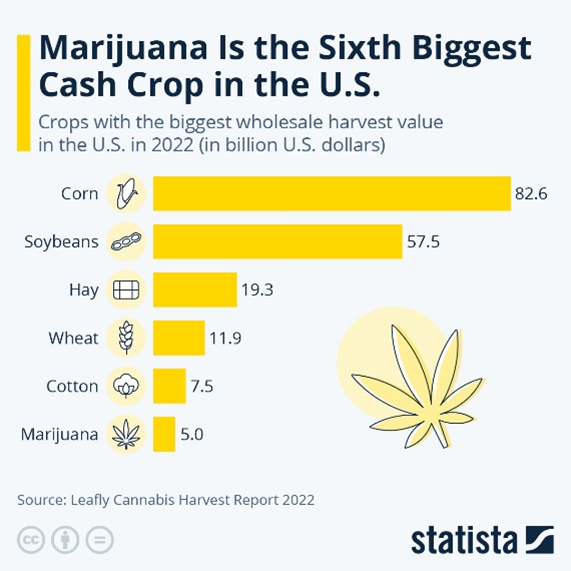Executives from Big Tech have been converging on Capitol Hill to discuss with lawmakers potential federal regulation of the booming artificial intelligence (AI) industry. Will anything tangible come of this glorified cocktail party? Probably not. However, now’s a good time for me to discuss the intersection of AI and cannabis…”high” technology, if you will, writes John Persinos, editor at Investing Daily.
It’s clear that AI isn’t just a fad. It’s revolutionizing our daily lives and the investment world. The cannabis industry is no exception.
Much of the stock market’s momentum in recent months has stemmed from the frenzy over AI. The size of the global AI market was valued at $136.55 billion in 2022 and it’s projected to expand at a compound annual growth rate (CAGR) of 37.3% from 2023 to 2030, according to Grand View Research.
The trend to integrate AI into the cannabis consumer market is in its nascent stage, but we’re quickly approaching a time when AI will be fully incorporated into a wide variety of marijuana-related functions, from growing to warehousing to retailing…from seed to sale.
AI is being deployed in cannabis farming to monitor, feed, and water plants, via drones and robots that use sensors connected to AI software systems.
For example, mobile robots outfitted with AI-linked cameras can roll down the aisles in cannabis greenhouses at night, scanning the plants with spectral imaging. AI turns these scans into a 3D model of each plant, then melds that 3D image with environmental data to generate a progress report for the plant. This regularly updated progress report assesses growth rates, THC levels, cannabinoid compounds, the potential onset of diseases, the presence of pests, and more.
 AI also is developing and operating cultivation programs that calibrate the watering and fertilizing of cannabis plants, as well as sunlight or LED levels. Scientists are using AI to create new genetic strains of cannabis with various potency levels and with greater ability to resist disease and pests.
AI also is developing and operating cultivation programs that calibrate the watering and fertilizing of cannabis plants, as well as sunlight or LED levels. Scientists are using AI to create new genetic strains of cannabis with various potency levels and with greater ability to resist disease and pests.
AI is further making cannabis hydroponics more efficient, by growing cannabis plants in a soil-less farming system driven by AI algorithms. AI-assisted growers can reduce water consumption, eliminate the use of pesticides, boost yield, and take up considerably less land.
In the agri-cannabis segment, the stakes are enormous. According to data published in August 2023 by the research firm Leafly, marijuana is the sixth-largest cash crop in the U.S., according to the most recently available data.
AI also is revolutionizing biotechnology research into medical marijuana. AI systems can crunch vast amounts of data in the search for which cannabinoid combinations are the most effective on specific types of cancer cells. AI is helping start-up marijuana biotech firms accelerate the typically lengthy clinical testing stage.
Finally, software companies that are developing AI apps are among the fastest growing investments in the cannabis industry. They’re also “picks-and-shovels” plays that reduce risk and increase diversification for investors, because they tend to also have non-cannabis clients.










